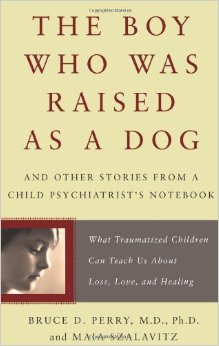 |  | The Boy Who Was Raised As a Dog
Author: Bruce D. Perry, M.D., Ph.D with Maia Szalavitz
Publisher: Basic Books; 1st edition (January 8, 2007)
Hardcover: 288 pages
ISBN-10: 0465056520
ISBN-13: 978-0465056521


|
Book DescriptionWhat happens when a young brain is traumatized? How does terror, abuse, or disaster affect a child's mind--and how can that mind recover? Child psychiatrist Bruce Perry has helped children faced with unimaginable horror: genocide survivors, murder witnesses, kidnapped teenagers, and victims of family violence. In The Boy Who Was Raised as a Dog, he tells their stories of trauma and transformation through the lens of science, revealing the brain's astonishing capacity for healing. Combining unforgettable case histories with insightful strategies for rehabilitation, Perry explains what exactly happens to the brain when a child is exposed to extreme stress-and reveals the unexpected measures that can be taken to ease a child's pain and help him grow into a healthy adult. Through the stories of children who recover-physically, mentally, and emotionally-from the most devastating circumstances, Perry shows how simple things like surroundings, affection, language, and touch can deeply impact the developing brain, for better or for worse. In this deeply informed and moving book, Bruce Perry dramatically demonstrates that only when we understand the science of the mind can we hope to heal the spirit of even the most wounded child.
OutlineThrough client cases, Dr. Perry explains the scientific understanding of brain development and the importance of nurturing young children. Perry starts off with the case of 7 year old Tina, who had suffered repeated sexual abuse, and now believed that she should act sexually with all men to win their approval. Her early experiences also caused her terrible stress, and affected her whole body, including her heart rate, her attention, her sleep, her fine motor control, and in her language development. Perry finds that he has only partial success in treating such profound damage caused by abuse. Other cases include a three year old girl who witnessed the murder of her mother and was alone with her mother's body for an extended period of time, children from the Branch Davidian ranch, a boy who was raised in a cage like a dog, a murderer who had been abused as a child, and children who claimed that they had abused by Satan worshippers. Through these cases, Perry sets out a great deal of scientific understanding of brain development and the importance of nurturing young children. He also points out some of the dangers of faddish theories about curing disorders in young children and of using treatments that haven't been shown to be effective. For example, he explains the enthusiasm for diagnosing Reactive Attachment Disorder and he argues that "Holding Therapy" that has been proposed and used as a cure can in fact be coercive and abusive.
About the AuthorBruce D. Perry, M.D., Ph.D., is an authority on children in crisis. Perry is the Senior Fellow of The ChildTrauma Academy, a not-for-profit organization based in Houston that promotes innovations in service, research and education in child maltreatment and childhood trauma (
www.ChildTrauma.org). Dr. Perry was on the faculty of the Departments of Pharmacology and Psychiatry at the University Of Chicago School Of Medicine from 1988 to 1991. From 1992 to 2001, Dr. Perry served as the Trammell Research Professor of Child Psychiatry at Baylor College of Medicine in Houston, Texas. During this time, Dr. Perry also was Chief of Psychiatry for Texas Children's Hospital and Vice-Chairman for Research within the Department of Psychiatry. From 2001 to 2003, Dr. Perry served as the Medical Director for Provincial Programs in Children's Mental Health for the Alberta Mental Health Board. He continues to serve as a Senior Consultant to the Ministry of Children’s Services in Alberta, Canada. Perry was an undergraduate at Stanford University and Amherst College. He attended medical and graduate school at Northwestern University, receiving both M.D. and Ph.D. degrees. Dr. Perry completed a residency in general psychiatry at Yale University School of Medicine and a fellowship in Child and Adolescent Psychiatry at The University of Chicago.





 Poll
Poll
